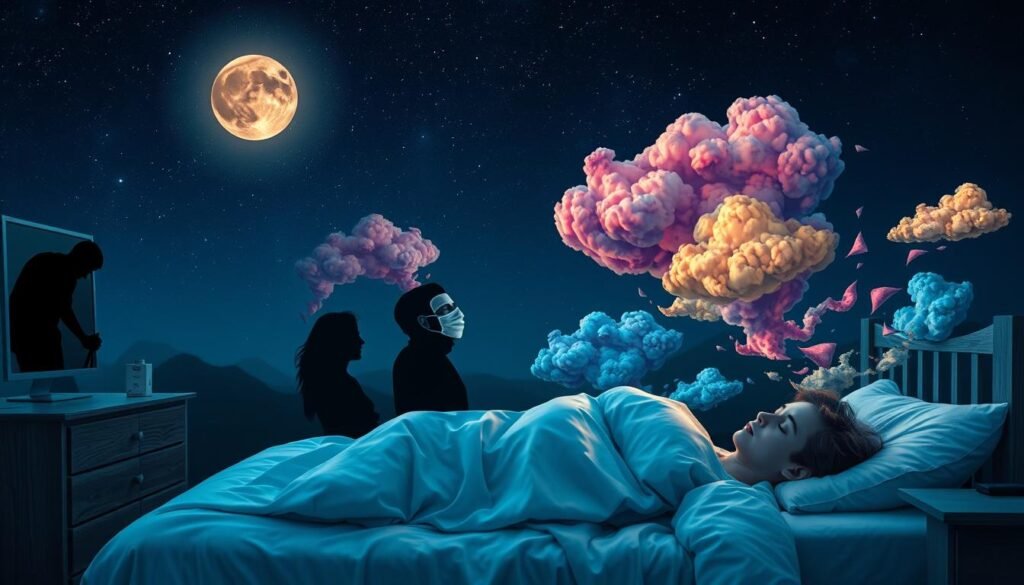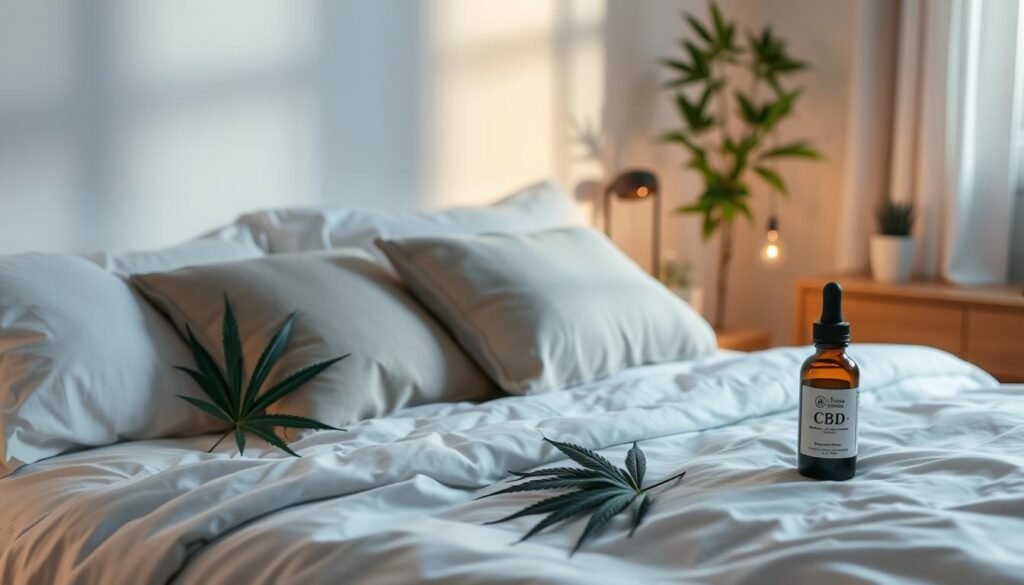Did you know about 70% of Americans don’t get the recommended seven hours of sleep nightly? This shocking stat has pushed many towards alternative sleep methods. CBD, coming from the cannabis plant, has become a popular choice. It’s known for its possible benefits in regulating sleep.
Even though cannabis has over 100 cannabinoids, CBD and THC get the most medical focus. After the 2018 farm bill, hemp plants with under 0.3% THC aren’t seen as illegal anymore. Yet, the FDA has approved a few CBD products for certain conditions. This leaves questions about how well it works for sleep problems.
Studies suggest CBD might help with sleep issues by calming the nervous system. It may lower anxiety and improve sleep quality. Still, understanding how CBD and sleep link together is complex. It’s important to look into how CBD works with the body and what science says about its use for better sleep.
Key Takeaways
- 70% of Americans do not get enough sleep each night.
- CBD is one of the most studied cannabinoids, alongside THC.
- Cannabis plants with less than 0.3% THC are now legal in the U.S.
- The FDA has limited approvals for CBD products, focusing on safety.
- Research indicates CBD may help address various sleep disorders.
Introduction to CBD and Sleep
In recent years, an introduction to CBD has become widely discussed. Especially in how it affects sleep quality. People are more interested in it because of problems like stress and poor sleep.
CBD comes from cannabis but doesn’t make you feel high. It could help with sleep problems. Studies show CBD works with the body’s system to possibly improve sleep.
However, we need more research on how much to take and if it’s safe for everyone. As we learn more, CBD could become a trusted solution for better rest.
| Aspect | Details |
|---|---|
| Key Compound | CBD (Cannabidiol) |
| Psychoactive Effect | No |
| Potential Benefits | Improves sleep quality, manages sleep disorders |
| Research Status | Ongoing research needed for dosage and efficacy |
| Common Issues | Stress, anxiety, sleep disturbances |
What is Cannabidiol (CBD)?
Cannabidiol, also known as CBD, is a well-known compound in cannabis. It doesn’t get you “high” like THC, another compound from the same plant. This makes CBD appealing to those who want the benefits of cannabis without feeling intoxicated.
CBD mainly comes from industrial hemp. Hemp is different because it has very little THC, often under 0.3%. This makes CBD from hemp legal to sell and use. Today, you can find CBD in various forms, such as oils, capsules, and creams, both online and in physical stores.
The interest in CBD is growing, but research on its safety and effectiveness is still in the early stages. Studies are being done to see how it can help with things like anxiety and trouble sleeping. However, a review of 84 CBD products found that many didn’t contain the amount of CBD advertised. This highlights a need for better quality control in the market.
Some CBD products, like Epidiolex for epilepsy, have been approved by the FDA. But, using CBD can also lead to certain side effects, such as dry mouth, diarrhea, and tiredness. It can also affect how some medicines work, especially blood thinners. That’s why it’s important to talk to a doctor before starting CBD, to avoid any unwanted effects.
| Aspect | Details |
|---|---|
| Source | Extracted from hemp |
| Psychoactive Effects | Non-psychoactive |
| Common Uses | Anxiety, Sleep Disorders, Pain Relief |
| Legal Status | Legally available if under 0.3% THC |
| FDA Approval | Epidiolex (epilepsy treatment) |
| Typical Side Effects | Dry mouth, fatigue, diarrhea |
The Endocannabinoid System and Sleep
The endocannabinoid system (ECS) is key to how we sleep. It uses certain chemicals and their receivers in our bodies. CBD can work with the ECS. This could help people who don’t sleep well.
How CBD Interacts with the Body
CBD, or cannabidiol, interacts with our body’s endocannabinoid system. It mainly works on two receptors, CB1 and CB2. Activating CB1 can lead to sleep, while both affect our serotonin levels. This is important for sleep. So, using CBD right could help fix sleep problems for many.
The Role of Cannabinoid Receptors
Cannabinoid receptors help keep our bodies in balance. The CB1 receptor is in our brains and is important for sleep. It helps improve sleep quality. The CB2 receptor helps our immune system. With these receptors working right, our sleep can get better. This makes studying ECS and sleep disorders very interesting.
Common Sleep Disorders and Their Impact
Sleep disorders are a big problem for many people. They range from occasional trouble sleeping to long-term issues. Insomnia, sleep-disordered breathing, and restless legs syndrome are major problems. They hurt our health and life quality. Knowing about these disorders helps us find better treatments. This includes looking into how CBD might help.
Understanding Insomnia
Insomnia means having a hard time falling or staying asleep. It leads to not getting enough good sleep. Many things, like stress and health problems, can cause insomnia. People with insomnia often feel tired during the day, get irritated easily, and have trouble focusing. It’s a very common disorder. So, many turn to options like medical cannabis for help.
Sleep Disordered Breathing
Sleep-disordered breathing includes conditions like obstructive sleep apnea. That’s when someone’s breathing stops for a bit while they sleep. It ruins sleep quality, causes snoring, and makes you very sleepy during the day. It can really decrease how well you feel overall. More people are now trying CBD to see if it eases these symptoms.
Restless Legs Syndrome
Restless legs syndrome (RLS) causes uncomfortable feelings in the legs and a strong need to move them. It mainly makes it hard to fall asleep. The condition makes people very tired and less productive during the day. Many are looking for ways to deal with this. CBD is being considered as a helper for better sleep and less discomfort.

The Role of CBD in Sleep Regulation: Does it Help or Hinder Sleep?
The discussion about CBD and sleep is growing. Its popularity as a sleep aid is on the rise. Research on CBD’s effects on sleep shows mixed results. Some people say CBD helps them sleep better. But, scientific studies show different outcomes.
In 2022, the CBD market hit $18 billion. It’s expected to triple in the next decade. Almost 64% of U.S. adults have tried CBD, often following a healthcare professional’s advice. Yet, clinical studies paint a more nuanced picture than personal stories do.
CBD may help ease anxiety, which could lead to better sleep. Those with anxiety might see a 60% to 70% symptom reduction after four weeks. However, another study found that a single dose of CBD didn’t change sleep patterns in healthy volunteers.
Heavy cannabis use could lead to dependency and withdrawal. This includes insomnia. Still, most people think of CBD as safe for sleep. But, there are risks like lack of market regulation, THC contamination, and drug interactions. Using CBD for sleep should be tailored to the individual.
| Research Finding | Outcome |
|---|---|
| Anecdotal Evidence of Sleep Improvement | Many individuals report better sleep quality when using CBD. |
| Single Dose Study in Healthy Volunteers | No significant impact on sleep was recorded. |
| Reduction in Anxiety Symptoms | 60% to 70% reduction noted after four weeks of CBD treatment. |
| Individuals Using CBD for Sleep | Generally consider it safe but should consult healthcare professionals. |
| Concerns Over Long-term Use | Potential for dependency and withdrawal symptoms. |
The research into CBD and sleep is ongoing. It stresses the need to understand how CBD affects each person. Be aware of how it might impact sleep quality and patterns.
Research Findings on CBD and Sleep Quality
Recent years have seen a surge in exploring how CBD affects sleep quality. This interest is fueled by new research. Many clinical studies focus on CBD’s role in fighting sleep problems, like insomnia. They show that CBD can lengthen sleep and make it better overall.
Clinical Studies and Their Outcomes
Clinical research highlights the positive impact of CBD on sleep. One study showed taking 160 mg of CBD in a capsule made people sleep longer than those who didn’t take CBD. This suggests larger doses of CBD could be more effective. Other studies found that 160 mg of CBD improved sleep quality more than lower doses. They also found benefits for kids and Parkinson’s patients who took CBD oil daily.
Cannabis Studies on Sleep Architecture
Research also looks at how CBD might change sleep patterns. Studies in mice show CBD can reduce certain inflammatory markers, affecting sleep stages. An 8-week study found that CBD improved sleep and mental health. Participants wore wrist trackers, showing how their sleep changed.
The growing research shows CBD’s potential in impacting sleep patterns. With many adults in the U.S. struggling with poor sleep, CBD offers a hopeful solution.

Potential Benefits of CBD for Sleep Disorders
CBD is gaining popularity for possibly helping with sleep issues. It addresses problems like anxiety and pain, which can interfere with sleep. This can make sleeping better.
Reduction of Anxiety and Its Effect on Sleep
Anxiety can make it hard to sleep well. But, studies show CBD might help calm the mind. This could make falling asleep easier. A review from 2020 found CBD could lessen anxiety and depression. This means using CBD at night might help people sleep better.
Pain Management and Improved Sleep
Living with chronic pain can disrupt sleep. CBD’s ability to reduce inflammation may help manage pain. This could improve sleep. Research says CBD helps ease different kinds of pain, even from cancer treatments. It also works with THC to decrease pain in multiple sclerosis patients. By controlling pain, CBD can lead to better sleep.
| Factor | CBD’s Impact |
|---|---|
| Anxiety | Reduces symptoms, promoting relaxation |
| Pain Management | Alleviates chronic pain, improving sleep conditions |
| Overall Sleep Quality | Enhances restorative sleep through reduced disturbances |
Risks and Side Effects of CBD Use
The popularity of CBD products is rising. But we must be careful about potential risks. Knowing these risks helps us use CBD safely. This is important because many CBD products aren’t regulated by the FDA. Possible side effects include dizziness and dry mouth. There are also concerns about how it might interact with drugs.
Understanding Dosage Variability
CBD dosage can be confusing. This is because the amount of CBD in products can vary. What the label says might not always be accurate. This can lead to unexpected side effects. People might feel tired or their appetite might change. It’s a good idea to choose products that third-party labs have tested. This ensures you get what you expect.
Possible Interactions with Other Medications
CBD can also affect how other medications work. For instance, it can change the impact of blood thinners or seizure medicines. If you’re on such medications, be careful with CBD. Always talk to a healthcare professional before trying CBD. This is especially important if you’re taking other medicines.
For more info on CBD risks and tips on using cannabinoid products, check this helpful resource.

Different Forms of CBD Products
Exploring CBD’s forms helps us understand how they can affect sleep disorders. Each type provides unique benefits for different needs and preferences.
Oils and Tinctures
CBD oils and tinctures are chosen often for their strong effect and versatility. Taken under the tongue, they work fast. This fast action is good for quick relief. But, the taste might not be for everyone. They allow for careful control of how much you take, helping find the right amount for better sleep.
Edibles and Capsules
Many love CBD edibles like gummies and chocolates for their taste and discreetness. Capsules are easy to take, much like any pill. But, they take longer to work because they have to go through your stomach. This wait can be a problem for those who need quick sleep help. Eating them often may lead to worse sleep.
Topical Applications and Vaping
Topicals like creams target discomfort directly without affecting the whole body. They’re less about sleep but can ease pain that keeps you awake. Vaping CBD works fast, similar to oils. Still, the safety of long-term vaping is not fully known. Different forms mean different experiences with sleep quality. To learn more about CBD and sleep, you can check out this resource.
| Form of CBD | Method of Use | Onset Time | Effects Duration |
|---|---|---|---|
| Oils and Tinctures | Sublingual | 15-30 minutes | 4-6 hours |
| Edibles and Capsules | Ingestion | 30-90 minutes | 4-8 hours |
| Topical Applications | Applied to the skin | Variable | 2-6 hours |
| Vaping | Inhalation | Immediate | 1-3 hours |
Consulting Healthcare Professionals Before Use
Before trying CBD, talking to a doctor is key. This is especially important for those with health issues or on medication. A medical opinion ensures that the chosen CBD is safe for you. It’s also vital to know how it might interact with your existing medicines.
People react to CBD in different ways. While some find relief, others might not or could have negative reactions. With lots of fake products out there, getting a doctor’s advice is crucial. They can guide you through choosing a safe product.
Things to talk about with a doctor include:
- Evaluating the source of the CBD product
- Understanding good manufacturing practices
- Reviewing certificates of analysis from independent labs
- Seeking information on any claims related to health benefits
Since the FDA doesn’t closely watch over most CBD products, professional advice is even more critical. Being careful and informed can help make CBD use safe. It might even improve your sleep.
Conclusion
Exploring CBD and sleep shows a deep link with our body’s endocannabinoid system. This article wraps up how CBD might help sleep. It talks about its ability to lessen anxiety and control pain, which can improve sleep quality. The use of cannabis-based solutions for sleep issues is becoming more popular.
Yet, it’s key to note the risks with CBD, like varying doses and drug interactions. As studies go on, the promise of CBD is clear, but so are the unknowns. More research is needed to fully understand how effective it is.
Looking ahead, CBD could be a helpful tool for managing sleep. But, we must weigh its potential benefits against the risks and limits. This balanced approach is vital as we learn more about CBD.